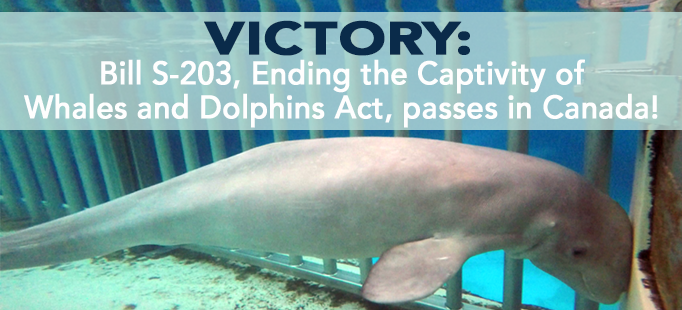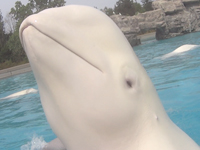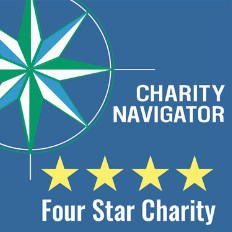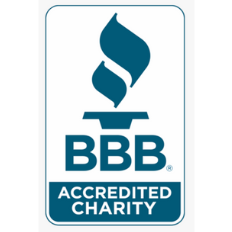December 2019: LCA Files Complaint Against Marineland Canada Over Performances of Cetaceans
December 17, 2019 - LCA filed a complaint with the Ontario Ministry of the Solicitor General against Marineland Canada based on performances of cetaceans (i.e., whale, dolphin, or porpoise).
The complaint was filed after the passage of Bill S-203 received Royal Assent on June 21, 2019, which led to the creation of new animal cruelty provisions in the Criminal Code of Canada. These provisions impose restrictions on keeping whales, dolphins and other cetaceans in captivity. These sections allow organizatinos that had cetaceans before the bill came into effect to keep the cetaceans but impose restrictions on their handling. The new animal cruelty provisions at section 445.2(4) of the Criminal code set out that:
(4) Every person commits an offence who promotes, arranges, conducts, assists in, receives money for or takes part in any meeting, competition, exhibition, pastime, practice, display or event at or in the course of which captive cetaceans are used, in Canada, for performance for entertainment purposes, unless the performance is authorized under a license issued by the Lieutenant Governor in Council of a province or by an authorized authority.
LCA attended, observed, and took video recordings at the dolphin show at Marineland on August 6, 2019. The show took place in a stadium in front of an audience. Marineland sold tickets to patrons to allow them access to the park and to watch the dolphin show. Dolphins are seen numerous times throughout the show performing tricks in front of an audience. LCA followed up with the Lieutenant Governor in Council's office, the Attorney General's office and the Solicitor General's office with an aim to determining whether Marineland has been issued a special permit for these performances, but have been unable to confirm.
At the same time of LCA's attendance, tickets were also available for purchase for encounters with Beluga whales. LCA witnessed, at the Beluga whale encounter, that patrons were permitted to pet and touch Beluga whales.
June 2019: Bill S-203, Ending the Captivity of Whales and Dolphins Act, Passes in Canada
In a landmark victory for marine mammals—on June 10, 2019, Bill S-203 overwhelmingly passed its third reading in the Canadian House of Commons! The bill, which bans the breeding, capture, and confinement of cetaceans, was signed into law on June 21, 2019 after receiving Royal Assent.
Bill S-203, which was first introduced by now-retired Sen. Wilfred Moore in Dec. 2015 and later adopted by Green Party Leader Elizabeth May in 2016, faced years of opposition in the Senate by pro-captivity Conservative lawmakers. Thanks to your hard work, the bill cleared one of its biggest hurdles on April 2, 2019, when it advanced through the Standing Committee on Fisheries and Oceans unamended following Marineland's last-minute requests for amendments to the bill.
Back in Nov. 2018, LCA created a petition—E-1919 (Cruelty to Animals)—urging the Canadian House of Commons to pass the bill. Having reached the required number of signatures, the petition was certified on March 7, 2019, and was presented to the House for their review.
August 13, 2017: Gia dies at Marineland Canada
Gia, a three-year-old beluga whale featured in LCA’s investigation at Marineland Canada, suddenly died. Gia was one of five captive cetaceans (whales, dolphins & porpoises) in Canada who died between November 2016 and August 2017.
January 26, 2016: LCA Investigation Reveals Cruelty to Whales at Marineland Canada
LCA conducted a five-month undercover investigation into Marineland Canada, during the summer and fall of 2015, with a primary focus on the park’s Beluga whale population and the conditions under which they are being held. The majority of the park’s 46 belugas are confined to just three main pools with no breeding program in place to regulate births, allowing Marineland’s population of belugas to continue to grow at an alarming and irresponsible rate.
Watch the video above to see LCA's undercover footage of Marineland Canada
(B-roll for Press: This email address is being protected from spambots. You need JavaScript enabled to view it. to Request Access)
Summary of Investigative Findings
The investigation uncovered disturbing inadequacies in the care of the whales, which include:
- Multiple beluga cows observed suffering for months from an undiagnosed condition reported by employees to park management as “genital rubbing” which caused the whales to rub themselves constantly against the concrete tank until blood was visible in the water.
- Gia, a juvenile beluga who was initially separated from her mother by accident, was left in a shallow isolation pool for three months while she became emaciated.
- A three-month-old beluga calf with a deep laceration near his fluke left untreated for two days before seen by a local small animal vet. The laceration reopened shortly thereafter.
- Belugas exhibiting signs of eye abnormalities, such as redness, irritation, and cataracts, and in some cases, young belugas appearing to develop cataracts prematurely.
- Numerous belugas with various medical conditions, such as hypersalivation, regurgitation, and raw, red throats, in some cases for prolonged periods of time.
- Routine deprivation of food for training purposes.
- The birth of 5 calves, one of which died.
The investigation also revealed that the whales were housed in enclosures that are not only barren in comparison to their natural environment but also unsafe and harmful in their very design and the interactions they promote, including:
- 46 belugas of both sexes ranging in age from newborns to mature adults confined in three main cement enclosures.
- Belugas, including newborn calves, covered in “rake marks”, from being attacked and bitten by dominant whales.
- Enclosures that did not provide the whales with areas away from public view, nor any protection from the elements.
- Enclosures with inadequate barriers that promote unsupervised public contact with the whales as well as the accidental or deliberate introduction of foreign objects into the whales’ enclosures.
- Kiska, Marineland’s lone orca, constantly swimming in circles in the smaller of her two pools.
- More than 100 barrels of industrial strength bleach kept on site, and employees repeatedly complaining of burning eyes and a strong chlorine smell on certain days when next to the pools.
These findings formed the basis of LCA's complaint to the Ontario Society for the Prevention of Cruelty to Animals for violations of the OSPCA Act and its prescribed standards of care. The OSPCA investigated but declined to take action against Marineland. The results of the OSPCA’s investigation are not publicly accessible, highlighting a disturbing lack of transparency despite the agency’s role as the enforcement arm of provincial animal protection legislation.
Marineland Canada, located in Niagra Falls, Ontario, first opened in 1961 as little more than a roadside attraction. John Holer, whose background is in the circus industry, purchased three sea lions to put on display and charged $.25 cents for admission. From that point forward, the park began growing rapidly and by the 1970s, had expanded to include a 2,000 seat "aquatheatre", as well as acquiring its first captive orca, "Kandu", who quickly became the star attraction. Marineland is now not only Canada's largest amusement park but also confines more beluga whales than any other park in the world.
Marineland and Mr. Holer are no strangers to controversy, having become the subject of intense public scrutiny after allegations emerged of mass animal graves located inside the park, a claim which was later proven to be true. Since then, the park has been involved in a litany of scandals involving both the park itself and the often erratic behavior of its owner, John Holer. Persistent pressure and condemnation from the public, activists, and particularly from former Marineland employees themselves have garnered widespread media coverage, including an in-depth investigation into the park by The Toronto Star.
Despite Marineland management and Mr. Holer’s repeated attempts to silence critics with frivolous lawsuits and threats of litigation, the atrocities committed by Marineland and Mr. Holer are firmly established in the public’s eye.
LCA’s investigation reveals that no whales should be kept in captivity and that doing so causes suffering and distress to these sensitive social creatures. The Canadian parliament has before it Bill S-203, “Ending the Captivity of Whales and Dolphins Act” which would prevent this tragedy being inflicted upon future whales by banning their capture, confinement, breeding, and sale.
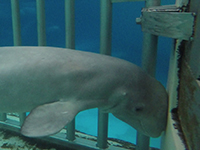 Gia head bumping the gate in isolation pen Gia head bumping the gate in isolation pen |
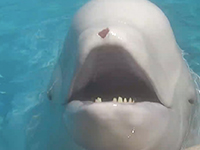 Beluga whale with visible wound on nose Beluga whale with visible wound on nose |
|
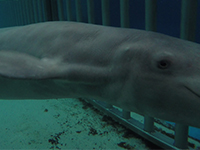 Gia's body closeup, with ribs visible Gia's body closeup, with ribs visible |
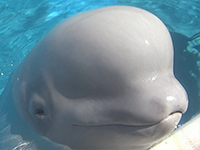 Beluga with eyes closed at feeding Beluga with eyes closed at feeding |
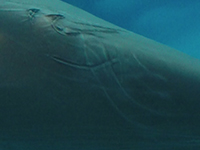 Rake marks on juvenile beluga whale Rake marks on juvenile beluga whale |
Read Expert's Statement on Beluga Whales at Marineland Canada.
Read LCA's Marineland Canada Investigation in the News:
VICE | Niagra Falls Review | The Dodo Article | Niagra This Week

